Every once in a while, I give a report here on what I’m currently reading. Keep in mind; this is not (necessarily) an endorsement of these books, just a note on what’s on my nightstand at the moment.
First, these are items I’ve read since my last report.
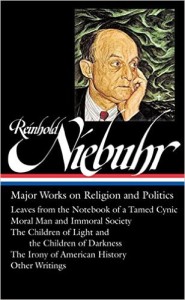 Major Works on Religion and Politics by Reinhold Niebuhr (Library of America) (Amazon|B&N)
Major Works on Religion and Politics by Reinhold Niebuhr (Library of America) (Amazon|B&N)
This collection includes several of Niebuhr’s major works, including Moral Man and Immoral Society. This volume is most useful to me because it includes shorter writings and lectures, many of which are not in print elsewhere. There’s some truly insightful—and sometimes prophetic—stuff in here.
A New Selected Poems by Galway Kinnell (Houghton-Mifflin) (Amazon|B&N)
I ordered this collection after someone (and now I can’t remember who) posted on social media a few lines from the poem “First Song.” As, y’all know, a deeply nostalgic type, I was drawn to this meditation of recollection of nightfall from the poet’s childhood. Best line: “And he began to hear the pond frogs all/ Calling on his ear with what seemed their joy.”
It’s a Long Story: My Life by Willie Nelson (Little, Brown) (Amazon|B&N)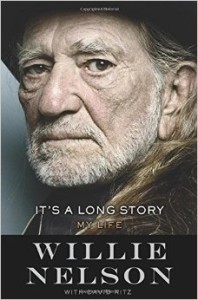
Of course I’m going to read Willie Nelson’s biography. Much of it is quite sad—especially Nelson’s explanation of why he left the Baptist church where he taught Sunday school to follow a spiritual journey that led him to a kind of New Age hodgepodge. Still along the way is some good material on gratitude, honoring heroes, and being yourself. My favorite quote: “If it weren’t for Waylon, I might still be back in Nashville looking to please the wrong people.”
The Last Interview (and Other Conversations), by Ray Bradbury, ed. Sam Weller (Melville House) (Amazon|B&N)
I like this series of interviews with writers, and this one might be among my favorites. In some ways, this book is kind of similar to Willie’s autobiography, since Bradbury speaks so much of how he avoided turning into just another science fiction writer. He was a poet and an “outlaw.”
Make Peace Before the Sun Goes Down: The Long Encounter of Thomas Merton and His Abbot, James Fox, by Roger Lipsey (Shambhala) (Amazon|B&N)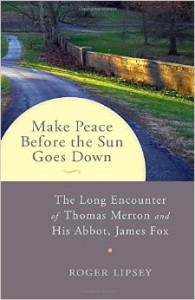
When I lived in Louisville, I would often drive out to Gethsemani Abbey and walk the rural grounds there, to think and pray. I found this book interesting not so much as an insight into Merton but as a picture of a situation we’ve all been in: of personality conflicts and power struggles within the same organization. Humorously, both Merton and Fox seemed to think the other was mentally ill. Best line in the book is a quote from Fox quoting a psychoanalyst who said that Merton wanted to be a hermit, but he wanted to be the kind of hermit in the middle of Times Square with electric signs announcing “Come and see the hermit!”
The Quiet Man: The Indispensable Presidency of George H.W. Bush, by John Sununu (HarperCollins) (Amazon|B&N)
An inside account of the Bush 41 presidency by the then-Chief of Staff. One comes away from the book even more convinced of what seems obvious: President Bush was not just a wise and experienced leader, guiding the nation through the end of the Cold War. He is also a decent and honest man.
A Month in the Country, by J.L. Carr (New York Review Books) (Amazon|B&N)
This short novel is about a World War I veteran who goes to a rural English village to restore a medieval mural in the church there. The mural, uncovered bit by bit, is of a scene of the Last Judgment. Along the way, the protagonist reveals some secrets and falls in love. The judgment theme is everywhere throughout, a striking picture of a post-Christian man grappling with his conscience and with the fleetingness of happiness in a life without God.
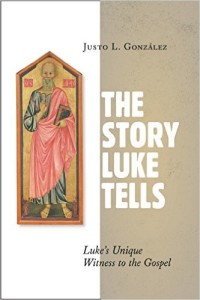 The Story Luke Tells: Luke’s Unique Witness to the Gospel, by Justo L. Gonazelz (Eerdmans) (Amazon|B&N)
The Story Luke Tells: Luke’s Unique Witness to the Gospel, by Justo L. Gonazelz (Eerdmans) (Amazon|B&N)
I don’t buy into many of Gonzalez’s historical-critical assumptions about the text. Even so, the book was valuable in pointing out key themes in my favorite of the gospels.
Crooked, by Austin Grossman (Little, Brown) (Amazon|B&N)
A supernatural science fiction thriller featuring Richard Nixon against monsters? Who couldn’t enjoy that? This was an often hilarious counterfactual re-telling of twentieth century history. Think of it as kind of Forrest Gump with zombies.
Welcome to the Orthodox Church: An Introduction to Eastern Christianity, by Frederica Mathewes-Green (Paraclete) (Amazon|B&N)
I’ve always enjoyed Frederica’s writing, even when I disagree with her. Of course, there’s much for an evangelical Protestant to disagree with in this book. I think, for instance, that she unfairly caricatures the penal substitutionary view of the atonement. Still, this book is beautifully written and explains, from the perspective of a convert, what is unique about the Eastern church. My favorite section was her explanation of the nous (often translated “mind” in English Bibles) as the “listening mind.”
And here’s what I’m reading right now:
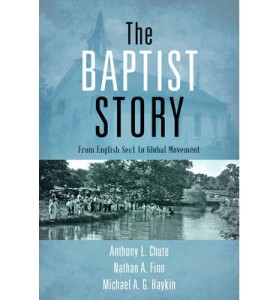 The Baptist Story: From English Sect to Global Movement, by Anthony Chute, Nathan Finn, Michael Haykin (B&H) (Amazon|B&N)
The Baptist Story: From English Sect to Global Movement, by Anthony Chute, Nathan Finn, Michael Haykin (B&H) (Amazon|B&N)
These three authors are among my favorite Baptist scholars. I’m just wading in (no pun intended) to this work, and so far find it brilliantly argued and colorfully narrated.
ESV Reader’s Gospels (Crossway) (Amazon|B&N)
I cannot overemphasize how much I love this. The gospels are printed here in beautiful typography with no chapter or verse divisions. This enables the reader to easily read through each gospel in a single sitting, as I did the Gospel of Mark yesterday. In so doing, we have something of the feel of the first recipients of these Gospels, most of whom were hearing the gospel they received as one narrative. I still need chapter and verse marks, of course, in the Bible I use to study with and teach from. But this volume helps me to just read and ponder. I love it.
How We Are, by Vincent Deary (Farrar, Straus and Giroux) (Amazon|B&N)
This volume is book one in a trilogy on what it means to be human. I’m about sixty pages in and am intrigued by the author’s assessment of the place of habit and memory in making us who we are. Much to be applied (or re-applied) to Christian worship and discipleship.
The Book of Strange New Things, by Michael Faber (Hogarth) (Amazon|B&N)![]()
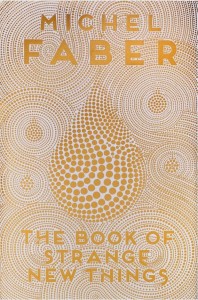
This novel is about an evangelical Christian missionary who travels to another planet to evangelize extraterrestrial beings. While there, he hears from his wife who is facing apocalyptic conditions back home on earth. Faber is a riveting storyteller, and along the way prompts some good questions about love, fidelity, marriage, and how those on the outside see Christians and our mission.
The Twilight of Social Conservatism: American Culture Wars in the Obama Era, John Dombrink (NYU Press) (Amazon|B&N)
The book looks at how the “wedge issues” that once benefitted social conservatives came to be, in recent years, wedges for the other side of the culture wars.








